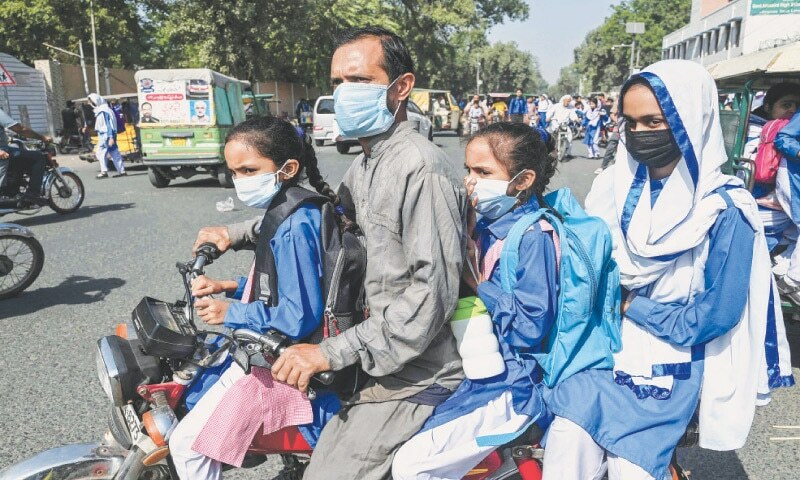• Marriyum claims 30pc of Lahore’s smog ‘comes from India’; asks citizens to check AQI before travelling to ‘hot spots’
• 188 vehicles impounded, five factories sealed; Rs140,000 fines imposed as part of anti-pollution measures
LAHORE: Punjab Senior Minister Marriyum Aurangzeb has called on the residents of Lahore to “declare war on smog”, stressing that it could take eight to 10 years to overcome the issue through dedicated individual and collective efforts.
Addressing a press conference on Friday, Ms Aurangzeb detailed the measures under the Anti-Smog Action Plan, revealing that certain “hot spots” in Lahore are now experiencing methane clouds and urban heat islands.
She noted that out of 45,000 motorcycles in Lahore, 1,800 emit visible smoke, whereas around 100,000 vehicles, including two- and three-wheelers, along with 1,200 brick kilns, 60,800 industrial units and numerous cooking stoves, are contributing to the city’s declining air quality.
“Lahore has only 33.3 per cent green area coverage and is home to 15 million people,” Ms Aurangzeb said. “Air quality remains unhealthy for 275 days of the year, and average temperatures have increased by 2.3 degrees Celsius.”
She emphasised that while 30pc of the city’s smog is transported from India, the remaining 70pc is generated locally.
She said Chief Minister Maryam Nawaz Sharif has been spearheading a multi-sectoral mitigation plan for the past six months, implementing strict measures across various sectors.
“All brick kilns across Punjab have been inspected. For the first time, instead of merely closing them, authorities have demolished non-compliant kilns. Of the 700 kilns in the province, 212 in Lahore have been dismantled. Now, all operational kilns use a ‘zigzag’ pattern with zero tolerance for violations,” she said.
The minister said that she personally oversaw the demolition of kilns belonging to influential figures. The Environment Protection Department conducted 15,000 inspections of industrial units, sealing 721 factories, demolishing 152 and implementing an emissions control and digital monitoring system. Farmers were offered a 60 per cent subsidy on super seeders to safely dispose of rice stubble without burning it.
She mentioned that over 400 FIRs were filed and arrests were made against those setting fires. Anti-Smog Squads are actively operating in targeted areas to raise awareness and take immediate action. Smoke-emitting vehicles are being monitored, and vehicles without fitness certificates are barred from entering Lahore.
“Dust materials that do not comply with SOPs are also being prevented from entering the city. Recently, the cabinet decided to clamp down on all smoke-emitting vehicles in Lahore,” she stated.
Ms Aurangzeb advised residents to check the Air Quality Index (AQI) on the Green App before heading towards smog hotspots like Badami Bagh, Shimla Hill, Lower Mall and Shahdara.
The minister also urged the media to run a comprehensive anti-smog campaign for the sake of public health, citing global figures that link smog-related air pollution to seven million annual deaths and a reduction in human life expectancy by up to 10 years.
Anti-smog campaign
The district administration has impounded 188 vehicles, sealed five factories and imposed fines totalling Rs140,000 as part of the anti-smog campaign.
Lahore Deputy Commissioner Syed Musa Raza stressed the importance of taking stringent measures to prevent environmental degradation and urged citizens to report smog-causing vehicles and adopt precautionary measures.
Meanwhile, the Ravi Urban Development Authority (RUDA) sealed five factories as part of its ongoing anti-smog operation, which has been underway for three weeks.
The operation has intensified action against those failing to comply with SOPs. Among the factories that have been sealed due to violations were JP Steel and Ali Hajveri Industries.
With Lahore ranking third globally on the Air Quality Index for pollution, the city’s residents face severe health hazards daily, exacerbated by high levels of smog and particulate matter from industrial emissions, vehicle exhaust and seasonal crop burning.
Experts have raised concerns over rising respiratory illnesses, particularly among vulnerable groups. District authorities are conducting operations to enforce pollution control protocols, sealing non-compliant factories and tightening vehicle emissions testing.
Published in Dawn, October 26th, 2024







